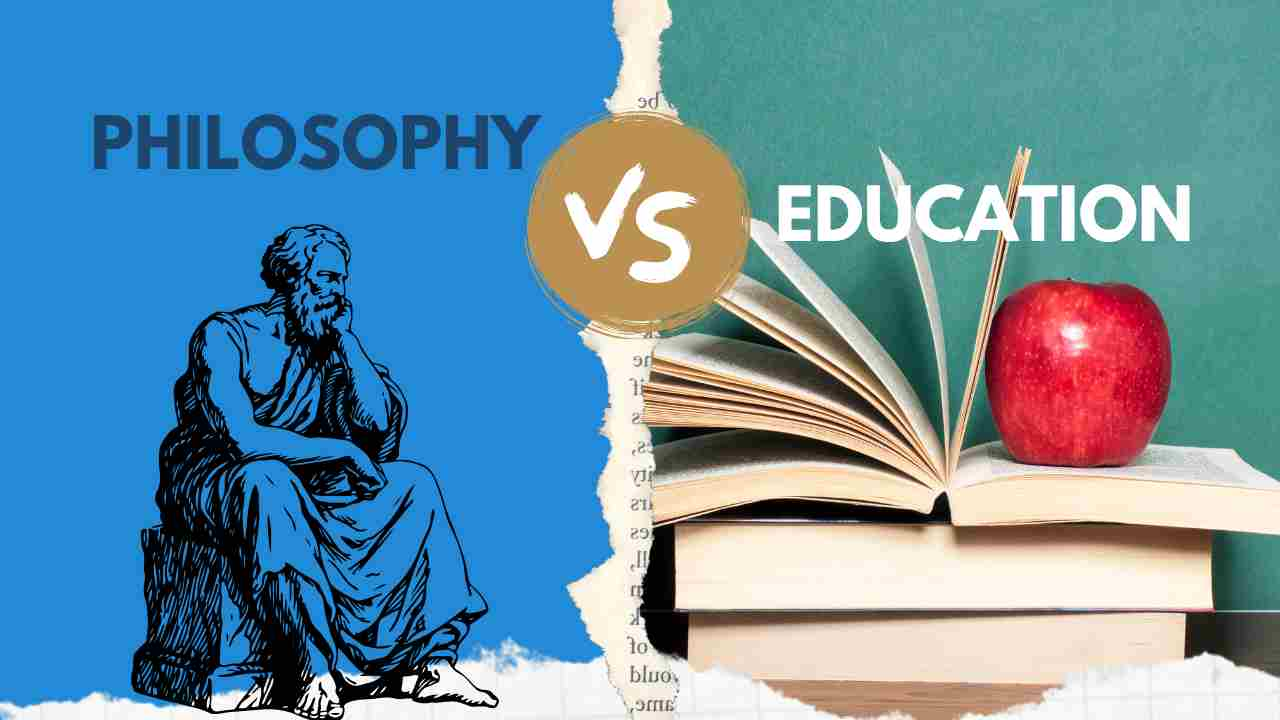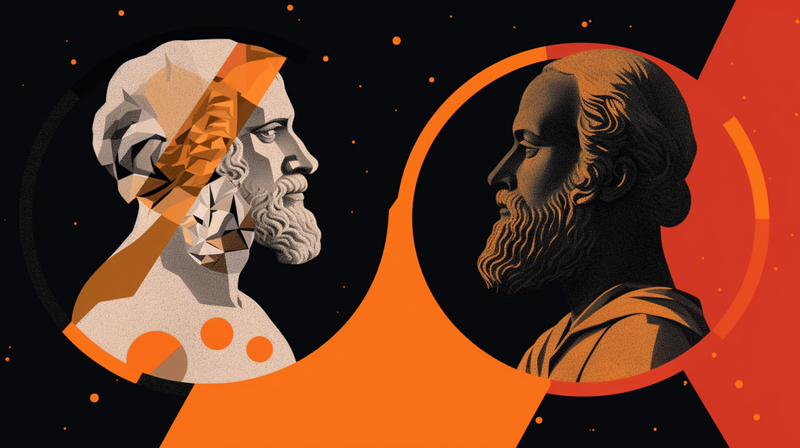Philosophy and science, two distinct yet interconnected disciplines, have played pivotal roles in shaping human understanding and knowledge. While philosophy delves into fundamental questions about existence, knowledge, and values, science explores the natural world through empirical observation and experimentation. Despite their differences in approach, the intersection of philosophy and science has led to profound insights and advancements in various fields. In this article, we will explore the dynamic relationship between philosophy and science and examine their collective impact on human knowledge. To help you understand both of these areas, you can turn to an excellent science tutor in Boulder who will help you master your material and successfully pass the tests.
Philosophy’s Role in Shaping Scientific Inquiry

Philosophy has long served as the foundation upon which scientific inquiry is built. From ancient Greek philosophers such as Aristotle and Plato to modern thinkers like Descartes and Kant, philosophical inquiries have laid the groundwork for scientific exploration. One of the key contributions of philosophy to science is the development of critical thinking and logical reasoning skills. Philosophers have grappled with questions of epistemology, metaphysics, and ethics, providing frameworks for formulating hypotheses and conducting empirical research.
Furthermore, philosophy has played a crucial role in defining the scope and methodology of scientific inquiry. The philosophy of science, also known as the epistemology of science, examines the nature of scientific knowledge and the criteria for evaluating scientific theories. Philosophical debates about induction, deduction, and the scientific method have informed scientific practice, guiding researchers in the formulation and testing of hypotheses. For example, the concept of falsifiability proposed by philosopher Karl Popper has influenced how scientists design experiments to test the validity of hypotheses. Some of these philosophical questions have set goals for providing new solutions to current problems, they have encouraged greater efforts and efforts by scientists, especially in the matter of, for example, creating the best treatment for autism so that children diagnosed with this condition receive the best care.
Moreover, philosophy encourages interdisciplinary dialogue and collaboration within the scientific community. By engaging with philosophical inquiries about the nature of reality, causality, and consciousness, scientists can gain deeper insights into their respective fields of study. The interdisciplinary approach allows for a more holistic understanding of complex phenomena, transcending disciplinary boundaries and fostering innovation. As such, philosophy serves as a bridge between different branches of science, facilitating interdisciplinary research and enriching scientific discourse. Various good things were created precisely from the deep conversations of learned philosophers and scientists who were having sweet red wine served in special wine glasses while some gave problems and others found solutions for them.
Science’s Impact on Philosophical Thought
Conversely, science has also influenced philosophical thought, challenging traditional beliefs and expanding the boundaries of human knowledge. The advancement of scientific discoveries, from Copernicus’s heliocentric model to Darwin’s theory of evolution, has prompted philosophers to reconsider long-held assumptions about the nature of reality and the human condition. Scientific findings have prompted philosophical inquiries into the implications of determinism, the nature of consciousness, and the ethical implications of technological advancements.
Moreover, science has provided empirical evidence to support or refute philosophical theories. For instance, neuroscience research has shed light on the neural correlates of consciousness, informing philosophical debates about the mind-body problem and the nature of subjective experience. Similarly, developments in cosmology and quantum mechanics have challenged traditional metaphysical conceptions of space, time, and causality, prompting philosophers to revise their ontological frameworks in light of new scientific evidence. Ever since the time of Magellan and other traders who traveled the world in ships or horses with traditional saddle blankets, the galaxy and the reality and shape of the world in which we live have been theorized.
Furthermore, the interdisciplinary nature of modern science has led to the emergence of new philosophical subfields, such as the philosophy of biology, the philosophy of mind, and the philosophy of physics. These subfields explore the philosophical implications of scientific discoveries within specific domains, addressing questions about the nature of life, the mind-body relationship, and the fundamental laws of the universe. By integrating scientific knowledge with philosophical inquiry, these subfields contribute to a more nuanced understanding of complex phenomena and their implications for human existence. All of these represent extremely interesting and complex topics, and if you visit one of the major European science festivals and rent a car in Beograd in order to travel comfortably and economically, you will have the opportunity to learn a lot more about these branches of science, as well as how they work together.
The Ethical Implications of Scientific Advancements
As science advances, the ethical implications of its progress become increasingly significant. Genetic engineering, for example, offers the potential to eradicate hereditary diseases and enhance human capabilities. However, it also raises concerns about the ethics of altering the human genome and the potential for unintended consequences. Artificial intelligence (AI) similarly presents ethical dilemmas regarding the use of autonomous systems in decision-making processes, such as in healthcare or criminal justice. Questions of accountability, transparency, and bias loom large in discussions about the ethical deployment of AI technologies.
Furthermore, scientific advancements often have environmental and social implications that must be carefully considered. The development of new technologies may exacerbate existing inequalities or contribute to environmental degradation. Philosophers and scientists alike grapple with questions about how to mitigate these risks and ensure that scientific progress benefits all members of society. Ethical frameworks such as utilitarianism, deontology, and virtue ethics provide valuable tools for analyzing the ethical implications of scientific advancements and guiding responsible decision-making. Young members of organizations like Readathon school fundraiser by reading and developing their good reading habits every day, slowly improve their scientific and philosophical knowledge in order to one day make significant changes.
Philosophical Perspectives on Consciousness and Identity

The exploration of consciousness and identity from philosophical perspectives continues to evolve in response to advancements in neuroscience, psychology, and cognitive science. Questions about the nature of subjective experience, the self, and personal identity remain central to philosophical inquiry, but new insights from empirical research challenge traditional philosophical assumptions. For example, neuroscientific studies of brain activity during altered states of consciousness raise questions about the relationship between brain function and subjective experience. It is these conditions that can lead to problems with certain areas of awareness for moral judgment that can be seen in various psychotic cases, to protect yourself in your home you can always count on excellent access control systems from Philadelphia that can be installed for added security.
Additionally, advancements in technology, such as brain-computer interfaces and virtual reality, offer new avenues for exploring questions about the nature of consciousness and identity. Philosophers examine the ethical implications of emerging technologies and the potential for enhancing or altering human consciousness. Debates about the ethical use of cognitive enhancement technologies, for example, touch upon issues of autonomy, authenticity, and the definition of a flourishing human life.
The Metaphysics of Time and Space
The metaphysics of time and space have been a subject of philosophical inquiry for centuries, but recent developments in physics have challenged traditional conceptions and opened up new avenues for exploration. Questions about the nature of time, the structure of space-time, and the possibility of alternative dimensions have captured the imagination of philosophers and scientists alike. For example, the theory of relativity revolutionized our understanding of space and time by showing that they are interconnected and can be influenced by gravitational forces. All of this has benefited young scientists who have excellent topics and goals to research, and an internet service provider that manages IT services in San Antonio provides its users with an excellent internet with which they can quickly research as well as join many like-minded communities and share their ideas and knowledge with other people.
Furthermore, developments in quantum mechanics have raised intriguing questions about the nature of reality itself. Quantum phenomena such as superposition and entanglement challenge our intuitions about causality and determinism, prompting philosophers to reconsider fundamental metaphysical assumptions. Debates about the metaphysics of time and space touch upon issues of free will, the nature of existence, and the relationship between the macroscopic world of everyday experience and the microscopic world of quantum particles.
Epistemological Foundations of Scientific Knowledge
The epistemological foundations of scientific knowledge are fundamental to understanding the nature and scope of human understanding. Epistemology, the branch of philosophy concerned with the nature of knowledge, examines questions about the criteria for justifying beliefs, the nature of truth, and the limits of human cognition. Philosophers and scientists alike grapple with issues of empiricism, rationalism, and the relationship between observation and theory in the pursuit of scientific knowledge. Such ideologies often conflict with the requirements of good marketing promotion, which often emphasizes quality, which is not always so present, but therefore includes a large number of people to try something, if your business needs good promotion, you can look for a Colorado Springs SEO company that will create a successful promotion plan for you.
Moreover, debates about scientific realism, instrumentalism, and anti-realism shed light on the nature of scientific theories and their relationship to reality. Philosophers explore questions about whether scientific theories provide true descriptions of the world or merely useful models for predicting and explaining observable phenomena. The philosophy of science also addresses issues of underdetermination and theory choice, examining how scientists evaluate competing theories in light of empirical evidence and theoretical considerations. As all of these questions are very important and difficult to answer, you should consider investing in research of this magnitude wisely, however, if you want to invest in something as secure as real estate for life, consider the beautiful homes in Boca Falls that will provide you with an oasis of peace to think about your philosophical questions.
The Intersection of Ethics and Artificial Intelligence
As artificial intelligence (AI) technologies become increasingly integrated into our daily lives, questions about the ethical implications of AI systems loom large. Philosophers and scientists grapple with issues of autonomy, accountability, and transparency in the development and deployment of AI technologies. Concerns about bias, discrimination, and the potential for harm raise questions about how to ensure that AI systems are designed and used in ways that promote fairness and justice. The incorporation of such technologies into the auto industry also raises new moral questions about the driver’s responsibility, and if you want to diagnose or improve your car, you can do it at a responsible and experienced transmission service in Buffalo.
Furthermore, debates about the moral status of AI systems and their impact on human values and social structures touch upon fundamental questions about the nature of ethics and the responsibilities of technological innovation. Ethical frameworks such as utilitarianism, deontology, and virtue ethics provide valuable tools for analyzing the ethical implications of AI technologies and guiding responsible decision-making. The development of such issues is in step with other quite important spheres of society and has contributed to the dizzying development of technology and demand for millimeter wave products that are built into phones, which expands technology and communication between people, and thus the possibilities.
Philosophical Implications of Quantum Mechanics
The advent of quantum mechanics has revolutionized our understanding of the fundamental laws of nature, but it has also raised profound philosophical questions about the nature of reality and causality. Philosophers and scientists alike grapple with issues of determinism, free will, and the nature of existence in light of quantum phenomena such as superposition and entanglement. If you visit one of the excellent European seminars of award-winning scientists in this field, you will surely gain a lot of new knowledge on this issue and clarify a lot of complicated questions, and while you are on this trip, rent a car in Beograd and visit some of the beautiful destinations that you want to see.
Furthermore, debates about the interpretation of quantum mechanics highlight the complexities of understanding quantum phenomena and their implications for our understanding of the universe. Philosophical interpretations such as the Copenhagen interpretation, the many-worlds interpretation, and the pilot-wave theory offer competing explanations for the nature of quantum reality and the role of observers in the measurement process. Various tests are set up and long-term investigations are carried out in order to prove some of these theories, and a lot of ready and expert people in their combat clothing approach some of the dangerous research so that we can finally get answers to some of these difficult questions.
The Ethics of Biomedical Research

Biomedical research holds great promise for advancing human health and well-being, but it also raises ethical questions about the use of human subjects, the distribution of benefits and risks, and the commodification of life. Philosophers and scientists alike grapple with issues of informed consent, research integrity, and the equitable distribution of healthcare resources in the pursuit of biomedical knowledge. However, this expensive and difficult researches sometimes contribute not only to health such, but also to a better understanding of psychology, even the response of animals to our presence, if you have your pet and want to know more about what it thinks and what some of its movements represent, you can visit one of the large pet fairs.
Furthermore, debates about emerging biotechnologies such as gene editing and stem cell research raise questions about the ethical boundaries of scientific inquiry and the potential for unintended consequences. Concerns about the exploitation of vulnerable populations, the commodification of genetic information, and the potential for eugenics highlight the importance of ethical oversight and regulation in biomedical research. This also affects some branches of medicine that are familiar to us every day, such as cosmetics and care, where various experiments are carried out in order to obtain the best preparations, and at the attended beauty courses, you can learn all kinds of useful things and discuss this topic as well.
Conclusion
In conclusion, the dynamic relationship between philosophy and science continues to shape human understanding and knowledge across diverse domains. From the ethical implications of scientific advancements to the metaphysical mysteries of time and space, philosophers and scientists collaborate to unravel the complexities of the universe and address pressing societal challenges. By engaging with philosophical questions and integrating ethical considerations into scientific practice, scholars strive to foster a more holistic and humane approach to inquiry, grounded in the pursuit of truth, wisdom, and human flourishing.




